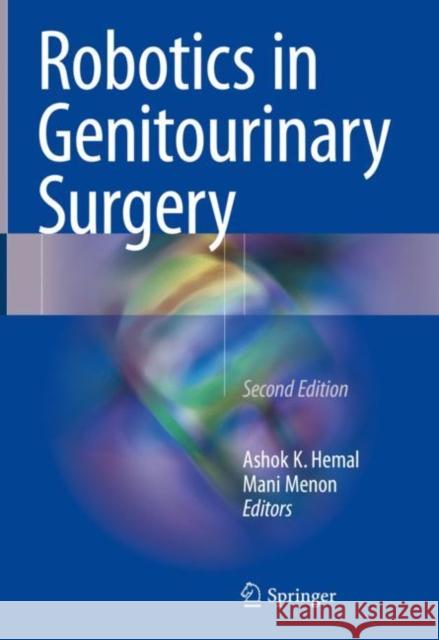Robotics in Genitourinary Surgery » książka



Robotics in Genitourinary Surgery
ISBN-13: 9783319206448 / Angielski / Twarda / 2018 / 961 str.
Robotics in Genitourinary Surgery
ISBN-13: 9783319206448 / Angielski / Twarda / 2018 / 961 str.
(netto: 843,44 VAT: 5%)
Najniższa cena z 30 dni: 848,19
ok. 22 dni roboczych.
Darmowa dostawa!
This new edition aims to provide comprehensive, state-of-the-art information about therecent developments in the areas of technology, robotic systems, Uro-Oncology,Reconstructive Urology, Pediatric Urology, Robotic Renal Transplant and FemaleUrology.
Part 1. History, Basics and Development Program.- 1. The History of Robotic Surgery.- 2. Robotic Instrumentation and Operating Room Setup.- 3. Port Placement in Robotic Urologic Surgery.- 4. How to improve operating room efficiency.- 5. Anesthetic Consideration for Robotic Urologic Surgery.- 6. Robotic Urologic Surgery: How to Make an Effective Robotic Program.- 7. Witnessing the Transition of Open to Robotic Surgery.- Part 2. Training and Research.- 8. Training in Robotic Urologic Surgery.- 9. Animal Laboratory Training: Current Status and How Essential Is It?.- 10. Training of Operating Room Technician and Nurses in Robotic Surgery.- 11. How to establish training program for Robotic Surgery.- 12. Training, Credentialing, and Hospital Privileging for Robotic Urological Surgery – American Perspective.- 13. Training, Credentialing, and Hospital Privileging for Robotic Urological Surgery – European Perspective.- Part 3. The Prostate.- 14. Development of the Vattikuti Institute Prostatectomy: Historical Perspective and Technical Nuances.- 15. CauteryFree Technique of Robot Assisted Radical prostatectomy: Impact on nerve preservation and Long Term Outcome on Recovery of Sexual Function.-16. Extraperitoneal Robot Assisted Radical Prostatectomy: Simulating the Gold Standard.- 17.Retzius Sparing Approach for Robot Assisted Laparoscopic Radical Prostatectomy.- 18. Robot Assisted Laparoscopic Pelvic Lymph node dissection for Prostate Cancer.- 19. Current Concepts in Cavernosal Neural Anatomy Imaging and Their Implications for Nerve Sparing Radical Prostatectomy.- 20. Robot Assisted Radical Prostatectomy for Large Glands and Median Lobe.- 21. Technique and Advances in Robotic Prostatectomy.- 22. Techniques to Improve Urinary Continence Following Robot Assisted Radical Prostatectomy.- 23. Techniques to Improve Sexual Function Following Robot Assisted Radical Prostatectomy.- 24. Complications of Robotic Prostatectomy.- 25. Functional and Oncological Outcomes after Robotic Prostatectomy.- 26. Robotic Simple Prostatectomy.- 27. How to decrease margin positivity in Radical Prostatectomy.-28. Radical Prostatectomy for High grade High volume prostate Cancer.- 29. Robot assisted Laparoscopic Radical Prostatectomy in patients with Single and Dual kidney transplant, heart and lung transplant, and those with inflatable penile prosthesis.- 30. Management of Complications of Robotic radical prostatectomy.- 31. Best Evidence Regarding the Superiority or Inferiority of Robot Assisted Radical Prostatectomy.- 32. Economics of Robot Assisted Radical Prostatectomy.- Part 4. Adrenal, Kidney and Ureter.- 33. Robot Assisted Adrenalectomy.- 34. Robot Assisted Laparoscopic Radical Nephrectomy: Basic principles and Technique.- 35. Robot Assisted Nephrectomy for Complex Tumors Robotic Complex Radical Nephrectomy including role of Lymphadenectomy and cytoreductive surgery.- 36. Robot Assisted Partial Nephrectomy: Basic principles and Technique.- 37. Robot Assisted Partial Nephrectomy for Complex Tumors.- 38. Robot Assisted Retroperitoneal Approach for Kidney Surgery.- 39. Newer Technique and Advances in Robotic Partial Nephrectomy.- 40. Robot Assisted Laparoscopic Nephroureterectomy for Benign and Malignant conditions.- 41. Manish Patel Robot Assisted Laparoscopic Pyeloplasty.- 42. Robotic Surgery for Urolithiasis.- 43. Ureteral Reconstruction Utilizing Robotic Assisted Technique.- 44. Outcomes and Complications of Robotic Kidney Surgery.- Part 5. Kidney Transplant.- 45. Robot assisted Donor Nephrectomy.- 46. Robot Assisted Kidney Transplantation with Regional Hypothermia: Technique and perioperative outcomes.- 47. Robot Assisted Kidney Transplantation in Morbidly Obese Technique and perioperative outcomes.- 48. Robot Assisted Kidney Transplantation: Complication and Longterm Outcomes.
Ashok K. Hemal, MS, DipNB, MCh, MAMS, FICS, FACS, FAMS, FRCS (Glasg): Professor, Department of Urology, Director, Robotics and Minimally Invasive Surgery, Wake Forest University School of Medicine, Wake Forest University Health Sciences, Medical Center Boulevard, Winston-Salem, NC. Dr Hemal has also contributed to several robotic programs worldwide.
Dr. Mani Menon, MD: the Director of Vattikuti Urology Institute, Chairman of Urology at the Henry Ford Health System in Detroit is a well known figure in urologic academia for many years. He is widely published and renowned for his impeccable literary style. As the pioneer of robotic radical prostatectomy - did the first major study to compare open and robotic prostatectomies, published in the BJU Ints in 2003 - he has performed the largest number of such surgeries and has published his impressive results in the Journal of Urology and BJU Intl. He has also organized international workshops on robotic urology and made many presentations on this topic.This updated volume provides a comprehensive guide to the recent developments of digital and intelligent technologies related to genitourinary surgery. New topics include the adaptation of simulators, training programs, standardized credentialing, evidence-based practice, as well as the economics of robotic surgery. The impact on public and global health is also covered.
Robotics in Genitourinary Surgery aims to help surgeons and patients adopt the techniques and procedures discussed, and in turn educate and expand research activities within the field.
1997-2026 DolnySlask.com Agencja Internetowa
KrainaKsiazek.PL - Księgarnia Internetowa









